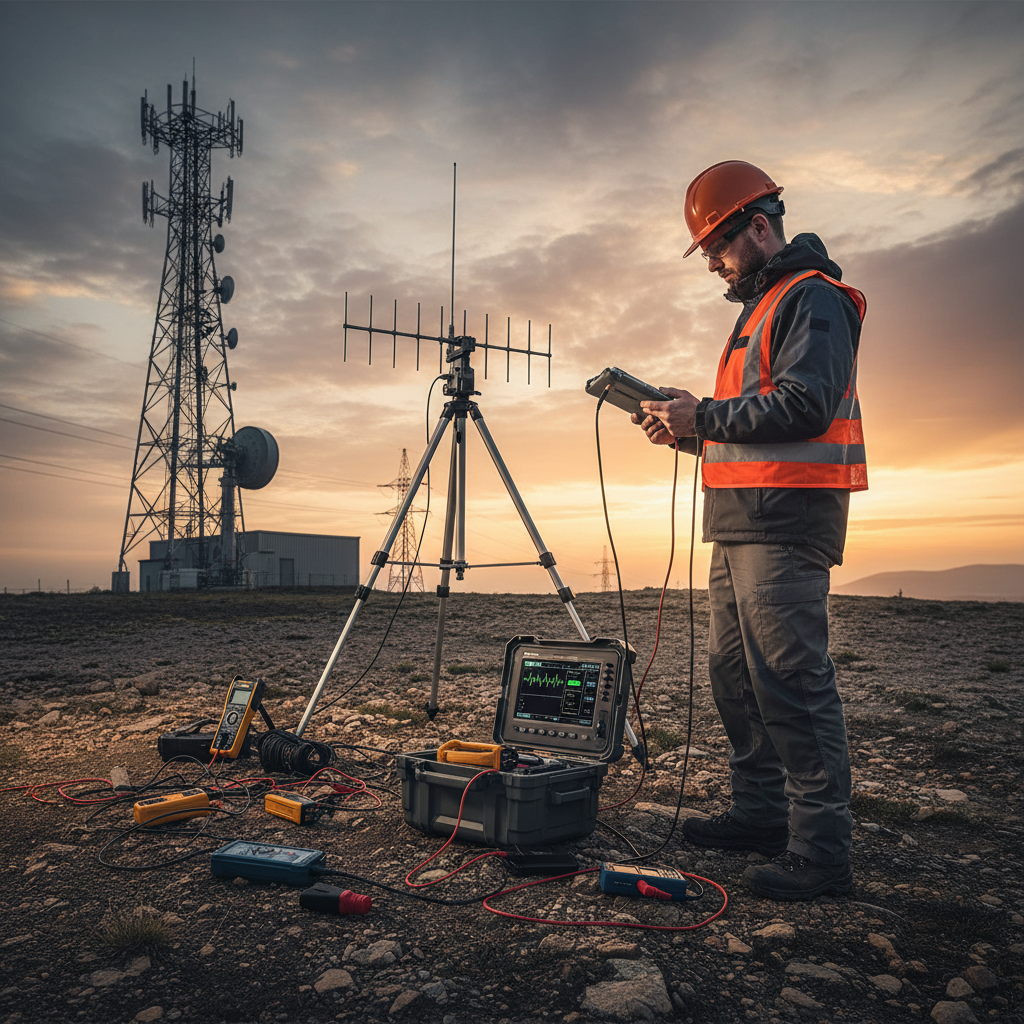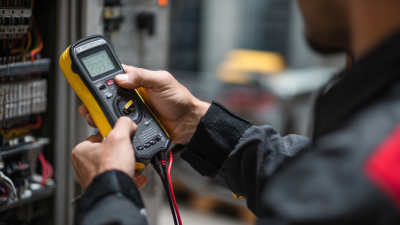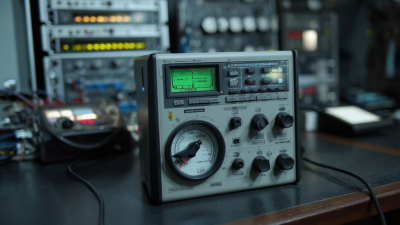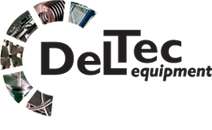What is Field Test Equipment and How It Benefits Your Testing Process
Field test equipment plays a crucial role in the realm of testing processes across various industries. As the demand for precision and reliability continues to rise, professionals are increasingly turning to specialized tools designed to simulate real-world conditions. This equipment allows for comprehensive evaluations of products, systems, and services before they reach the market, ensuring they meet the highest standards of performance and safety.

By integrating field test equipment into their testing protocols, organizations can enhance the accuracy of their results but also streamline their overall testing process. These tools provide invaluable data that help in identifying potential issues early on, saving time and resources in the long run. Moreover, the insights gained from field tests enable teams to make informed decisions, ultimately leading to improved product quality and customer satisfaction.
In this article, we will explore what field test equipment is, delve into its various types, and highlight how it benefits your testing process. Understanding the significance of these tools will empower businesses to optimize their operations and stay ahead in a competitive landscape.
Understanding Field Test Equipment and Its Importance in Modern Testing
Field test equipment plays a crucial role in modern testing methodologies, providing professionals with the tools necessary to assess performance and reliability in real-world conditions. Unlike laboratory environments, field tests allow for more accurate data collection by simulating the actual operational circumstances the product will face. This is particularly important for industries such as telecommunications, construction, and environmental science, where conditions can greatly affect outcomes.

Tips: When selecting field test equipment, consider the specific requirements of your testing environment. Ensure that the tools are rugged and portable, as they often need to withstand varying conditions. Additionally, familiarize your team with proper usage techniques to minimize errors during the testing process.
Incorporating field test equipment not only enhances the quality of the data gathered but also streamlines the decision-making process. Users can identify potential issues early, leading to timely solutions that save both time and resources. Furthermore, these tools provide valuable insights that can guide future product development and improvements.
Tips: Always maintain your field test equipment to ensure accuracy and reliability. Regular calibration and servicing can prevent data discrepancies and extend the lifespan of your tools.
Key Features and Functions of Field Test Equipment
Field test equipment plays a crucial role in ensuring the accuracy and reliability of testing processes across various industries. One of the key features of this equipment is its portability, allowing testers to perform evaluations in real-world conditions rather than confined laboratory settings. This versatility means that field test equipment can be designed to withstand diverse environmental conditions, making it suitable for outdoor use. Additionally, many devices incorporate advanced data collection and analysis capabilities, enabling immediate feedback and insights, which are essential for timely decision-making.
Another important function of field test equipment is its ability to enhance efficiency through automation and remote monitoring. Many modern devices come equipped with wireless connectivity, allowing users to monitor testing processes in real-time from a distance. This feature not only reduces the need for extensive manual labor but also minimizes human error. Furthermore, through integrated software solutions, data can be easily recorded, analyzed, and shared, streamlining the overall testing process and providing a comprehensive understanding of results. These key features make field test equipment an indispensable tool in various fields, from construction and engineering to environmental assessments and telecommunications.
Top Benefits of Using Field Test Equipment in Various Industries
Field test equipment plays a crucial role across various industries, enhancing the testing process and ultimately improving product quality and reliability. Its primary benefits include real-time data collection, accuracy in measurements, and the ability to simulate real-world conditions. By incorporating field test equipment, organizations can identify issues early in the development cycle, reducing costs and accelerating time to market.
Tips: When selecting field test equipment, ensure it is suited for your specific testing needs. Always consider the scalability of the equipment, especially if you expect to integrate it with emerging technologies like AI and big data analytics in the future. Additionally, training staff on the proper use of this equipment can vastly improve the quality of the data collected.
Industries such as healthcare, manufacturing, and telecommunications are leveraging field test equipment to stay competitive. For instance, in the healthcare sector, precise testing can lead to better patient outcomes, while in manufacturing, it can ensure that products meet industry standards before reaching consumers. By investing in the latest field test technologies, companies can not only enhance their operational efficiencies but also position themselves to adapt to the evolving landscape shaped by innovations in AI and quantum computing.
What is Field Test Equipment and How It Benefits Your Testing Process - Top Benefits of Using Field Test Equipment in Various Industries
| Industry | Type of Field Test Equipment | Benefits | Example Applications |
|---|---|---|---|
| Telecommunications | Signal Analyzers | Real-time data analysis and troubleshooting | Network coverage testing |
| Construction | Soil Testing Equipment | Ensures safety and compliance with regulations | Site preparation assessments |
| Environmental | Water Sampling Kits | Assess water quality on-site | Pollution monitoring |
| Healthcare | Portable Diagnostic Devices | Accessibility of health data in remote areas | Mobile health clinics |
| Manufacturing | Portable Vibration Analyzers | Prevention of equipment failures | Machinery maintenance |
Criteria for Selecting the Right Field Test Equipment for Your Needs
When selecting the right field test equipment, it is essential to consider your specific testing needs and the environment in which the equipment will be used. First and foremost, evaluate the types of tests you need to conduct. This could range from soil analysis to water testing, each requiring specialized tools that can withstand field conditions. The equipment should be durable, portable, and user-friendly, allowing for efficient data collection and analysis in various settings.
Another critical factor is the accuracy and reliability of the equipment. Ensuring that the field test instruments produce consistent results is vital for making informed decisions based on the data collected. Look for equipment that has been tested and validated in real-world scenarios. Additionally, consider the support and resources offered by the manufacturers, such as training sessions and troubleshooting assistance, as these can significantly enhance your testing process and ensure you maximize the benefits of the equipment you choose.
Field Test Equipment Usage by Category
Future Trends in Field Test Equipment for Enhanced Testing Processes
The evolution of field test equipment is significantly shaping the future of defect inspection processes, driven by rapid adoption of advanced technologies. Key players in the market are integrating innovations like Artificial Intelligence (AI) and Machine Learning (ML), which enable automated analysis of inspection data. This automation not only increases the efficiency of data processing but also enhances the accuracy of identifying potential defects in manufacturing, resulting in improved product quality and reduced time-to-market.

As industries continue to embrace these technological advancements, the market for specific testing equipment is expanding. For example, the PCB testing equipment sector is experiencing remarkable growth, fueled by the integration of sophisticated testing methodologies. Furthermore, market projections for various sectors, such as VXI testing equipment and leak testers, indicate a healthy compound annual growth rate, illustrating the demand for enhanced testing capabilities. The focus on efficient, technology-driven solutions underscores the industry's commitment to optimizing operational processes and ensuring compliance with stringent quality standards.
Related Posts
-

The Ultimate Guide to Choosing the Best Phone Testing Equipment for Your Needs
-

Revolutionizing Quality Control: The Impact of Testing Meters in Modern Manufacturing Industries
-

Understanding the Essential Role of Field Test Equipment in Modern Industries
-

Maximize Your Game: How a Ball Rebound Tester Can Enhance Your Basketball Skills
-

What is Meter Test Equipment? A Complete Guide to Understanding Its Importance and Usage
-

Innovative Solutions for Precision Line Testers





